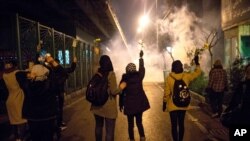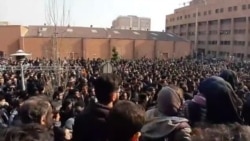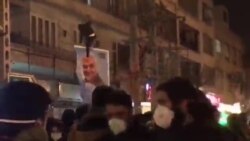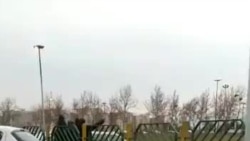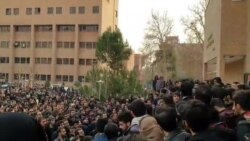Hundreds of students at a prestigious Iranian university have openly denounced their Islamist rulers in a third day of protests since the government admitted to accidentally downing a Ukrainian passenger jet.
In several video clips vetted by VOA, the students at Tehran's Sharif University of Technology, a top engineering school, appeared to be gathered in an outdoor location on campus on Monday, chanting slogans and listening to several speakers criticize the government. VOA could not independently verify the authenticity of the clips.
In one video, the students chanted, "They killed our elites and replaced them with mullahs."
The reference to "elites" was a tribute to the dozens of Iranian students who had been on the Ukraine International Airlines plane that was downed by a missile shortly after taking off from Tehran on a flight to Kyiv last Wednesday. For three days, Iranian leaders insisted that mechanical problems could have caused the crash that killed all 176 people on board, until admitting on Saturday that Iranian military personnel mistakenly shot it down.
The pre-dawn crash happened hours after Iran fired missiles at U.S. forces in Iraq and was bracing for a U.S. counterstrike that never came. Iran's missile attacks, which caused no casualties, were in retaliation for what the U.S. called a self-defensive strike that killed top Iranian general Qassem Soleimani in Baghdad on Jan. 3.
Iranian leaders' belated acknowledgment of Western intelligence that they were responsible for the crash angered many Iranians, including students at a Tehran university whose Saturday night vigil for the crash victims turned into an anti-government rally. Protests spread from Tehran to at least 18 other cities on Sunday, according to photos and video clips sent to VOA Persian and reports by other Persian-language media.
A video widely shared on social media showed demonstrators in Tehran fleeing tear gas fired by police late Sunday. Other online footage showed a woman on the ground with blood nearby as bystanders said she had been shot and tried to pick her up.
Iranian state media quoted Tehran's police chief Gen. Hossein Rahimi as saying his officers had not opened fire on protesters and had acted with restraint.
Police maintained a strong presence in Tehran on Monday, according to a video clip vetted by VOA. It appeared to show officers in riot gear, some on horseback, along the city's Azadi Street.
"You can see the Iranian people are in the streets -- in astounding numbers in spite of enormous personal risk to themselves," U.S. Secretary of State Mike Pompeo said in a Monday speech at the Hoover Institution.
"They're burning posters and billboards with Soleimani's face on them, and chanting ‘Soleimani is a murderer.' They know he was one of the key architects of their oppression," Pompeo added, referring to other widely shared video clips of Sunday's protests.
Pompeo said the Trump administration has called on U.S. allies in the region and around the world to repeat U.S. President Donald Trump's tweeted demands for Iran not to harm the protesters. The U.S. has said Iranian security forces killed at least 1,500 people, mostly with gunfire, in a crackdown on nationwide protests last November.
U.N. Secretary-General Antonio Guterres' spokesperson Stephane Dujarric told journalists that reports of people being shot during the Iran protests were "clearly worrying."
"It's important, as with any demonstration, that reports of the lethal use of force be fully investigated," Dujarric said.
A second clip from Monday's protest at Sharif University appeared to show a student shouting an angry message to the gathered crowd: "Our elites have left the country for good, and they (Iran's leaders) blew them up. If it was not an international flight, we would never have been informed of the truth."
In a third clip, another protester can be heard telling the students through a megaphone: "We want clarity. This country has been suffering from a lack of transparency for years. They lied to us through all these years. Excuse my language; they treat us like donkeys."
There were no reports of arrests or clashes at Sharif University.
But London-based Internet monitoring group Netblocks tweeted that it recorded a drop in connectivity at the university on Monday as the students staged their protest. It said Iran's national connectivity rate was stable, despite what it said were sporadic disruptions on the third day of protests.
Iranian authorities imposed a near-total Internet shutdown on the country within days of the outbreak of the November protests and only lifted it after a week.
In his latest tweet in support of the protests, Trump on Monday praised Iranians who were seen in other online footage walking around a giant U.S. flag painted on the ground. Iranian authorities have placed such images around the country to encourage people to walk over the U.S. flag as a sign of disrespect.
Trump had tweeted several other supportive messages in Farsi on Saturday and Sunday, marking the first time he had tweeted in the Persian language. In an interview with VOA Persian on Monday, State Department spokeswoman Morgan Ortagus said there had been an "explosion" of re-tweets and likes of the president's Farsi posts.
"By the president tweeting in Farsi over this weekend, not just in English, and by Secretary Pompeo tweeting as well, we want to make sure that we are using our platform here in the U.S. government to shine a light on these protests," Ortagus said.
"If (Iran’s rulers) decide to try to kill innocent protesters again, to imprison thousands of people peacefully protesting, to cut off the Internet -- we want them to know that they’re not going to get a free pass, that we are watching, the world is watching, and we will bring it to light when that happens," she said.
In a briefing with reporters Monday, a senior State Department official also talked about the message the Trump administration was sending with the Soleimani strike and ongoing concerns about Iranian proxy groups in the Middle East.
"We would hope based on the president's demonstration, the administration's demonstration of how it is going to respond -- that is, that the United States has made clear that we plan on being disproportional in our response to Iranian aggression -- that hopefully this will result in the deterrence that we're looking for," the official said. "The ball is in Iran's court."
This report was produced with contributions from VOA's Extremism Watch Desk, VOA Persian's Guita Aryan at the State Department and Margaret Besheer at the United Nations.




